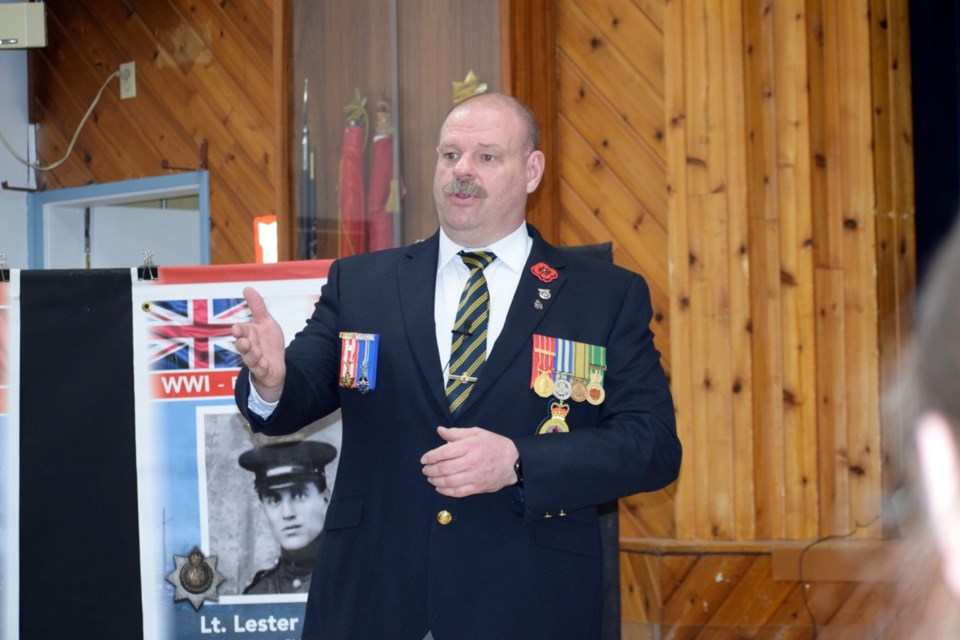ESTEVAN - Local military historian Craig Bird was able to resume his tradition of paying tribute to the Battle of Vimy Ridge, and coincidentally, it was a fine time to do it.
Bird held his Vimy Day event at the Estevan branch of the Royal Canadian Legion on April 9 – the 105th anniversary of what proved to be one of Canada’s most important military victories. He discussed the battle and the contributions of those from southeast Saskatchewan.
He pointed out that preparations for Vimy actually started in the fall of 1916, and a lot of Canadian soldiers died in the months leading up to April 9, 1917. Much work was needed for the four Canadian divisions to be ready after several failed attempts by the British and the French to dislodge the Germans from the ridge.
“They were building new trench systems. They were training. The Canadians had an innovative training system at the time where they actually taught everybody – right down from the lowly private right up to the general – everybody’s job, so that if somebody got killed, they knew what they were doing and they continued on with the attack,” said Bird.
Previously, if an officer or senior staff member died, the rest of the men didn’t know what to do or where to go.
“That’s why a lot of these overwhelming attacks failed is because the leadership failed. So, Canada thought ‘Let’s fix this. We will train. We will show everybody.’ They built models on the ground, and actually walked through with all of the troops so that they knew what they were doing. Innovative at the time, but something that we do as common practice now.”
German forces referred to the week prior to the battle as The Week of Misery due to the intensity of the shelling by Canadian forces. Canadians fired 1.2 million shells of artillery.
“You can just imagine the amount of men and equipment that had to be readied and moved into position for all of this, and it took months,” said Bird.
Germans could see what was happening, and fired at Canadian forces.
Most of the casualties occurred on April 9, which was Easter Monday. Twenty thousand Canadian soldiers, carrying equipment and ammunition, attacked to remove the Germans from their position. There was sleet and rain at the start of the day, and trying to advance would have been difficult, Bird said.
Most gains occurred on the first day, but Canadians still had to take a hill known as the pimple, which provided more resistance than anywhere else. It was a high feature the Germans wanted to keep.
“Because of that, the Princess Patricia’s Canadian Light Infantry and the Royal Canadian Regiment were the main forces that attacked that hill, and suffered great casualties, but on the fourth day were able to capture all of that area and be victorious,” Bird said.
A couple of videos were shown. One was a silent video that Bird narrated and reinforced the preparation work for the battle. The other looked at what happened and the significance of the victory.
Bird also shared the local contributions. Twenty-two people from the Estevan area died during the Battle of Vimy Ridge and 15 more were from Weyburn.
In the area that Bird considers to be the southeast – Highway 1 to the north, Highway 6 to the west, the Canada-U.S. border to the south and the Saskatchewan-Manitoba border to the east – there were 111 people killed in action at Vimy Ridge. Most of the towns and villages in the region were home to somebody killed in the battle.
Bird noted that a lot of the history isn’t being taught in the schools or even universities any longer. As the commanding officer of the 2901 Estevan Army Cadets, he teaches military history to the youths.
The Â鶹ÊÓƵeast Military Museums is a private museum with locations at the local Legion branch and at Bird’s property outside of Estevan. They rely on donations to remain operating.
After the presentation was finished, Bird offered a tour of the artifacts of that can be found at the Estevan legion. Additional items were available for people to see.
“We’d like to try to keep this running as long as we can. We survived the pandemic, so we want to keep on going and get everything running again,” said Bird.
Â鶹ÊÓƵeast Military Museums is a registered charitable organization.





